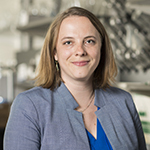Arnaldo Serrano, Assistant Professor of Chemistry & Biochemistry, and Katharine White, Clare Boothe Luce Assistant Professor of Chemistry & Biochemistry, have been selected as recipients of the National Science Foundation (NSF) Faculty Early Career Development (CAREER) Award. The award is given to recognize outstanding research and its integration with education, and it is one of NSF’s most prestigious awards for junior faculty members.

Serrano was selected for his proposal entitled “Nonlinear Infrared Studies of Biomolecular Coacervation.” Coacervation, also known as liquid-liquid phase separation (LLPS), is a key factor in understanding how biological systems are organized. Protein-dense droplets that are formed during LLPS are an important part of the mechanism of cellular organization. Improper organization and proliferation of toxic proteins have been implicated as potential causes of disease. However, little is known about the nature of phase separation at the level of protein secondary structure and hydration. Building on recent findings from his lab, Serrano will develop spectroscopic tools for in-situ characterization of protein structure, dynamics, and solvation with these phase-separated droplets in order to better understand protein folding and behavior. In addition, he will be creating online coding modules and other educational materials for undergraduate students and conducting workshops to teach advanced spectroscopic and optics topics to graduate students.
Serrano joined the faculty at Notre Dame in 2017 after completing a postdoctoral fellowship at the University of Wisconsin, Madison. He received his Ph.D. in chemistry from the University of Pennsylvania and his B.A. in chemistry from Rutgers University. He is also the recipient of the 2015 ACS Division of Physical Chemistry Postdoctoral Research Award and the 2015 Hans Neurath Outstanding Promise Award.

White was selected for her proposal entitled “Molecular Mechanisms of pH-Sensitive Proteins, Pathways, and Cell Behaviors.” In mammalian cells, intracellular pH (pHi) is typically maintained between 7.0 and 7.2. However, transient increases can trigger or enable various cellular processes, including cell-cycle progression, migration, and loss of polarity. Even though the overall effect of pHi on these processes is known, the pH-sensitive proteins that sense and mediate these responses are largely unknown. White will use new molecular tools her lab has developed to manipulate pHi in single cells and elucidate the molecular mechanisms of pH-sensitive proteins. Along with this research, White plans to develop project-based learning modules for a graduate course in chemical tools for studying biology and disease. She will also create one-hour activity-based STEM learning modules for use in middle school classrooms, initially for use at Edison Intermediate, a local middle school.
White joined the faculty at Notre Dame in 2019 after completing a Ruth L. Kirschstein National Research Service Award Postdoctoral Fellowship at the University of California, San Francisco. She received her Ph.D. in chemistry from the Massachusetts Institute of Technology and her B.S. in chemistry from Saint Mary’s College. She is also the recipient of an NIH Director’s New Innovator Award.
Originally published by at chemistry.nd.edu on April 07, 2023.